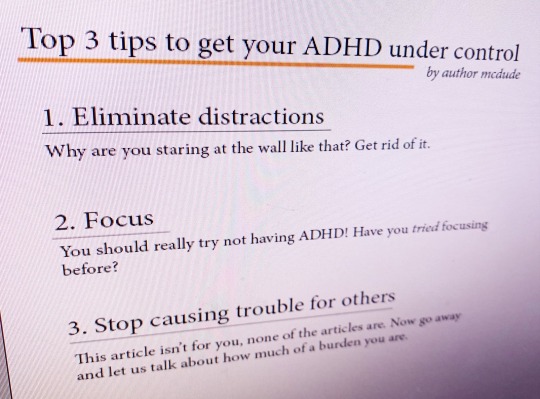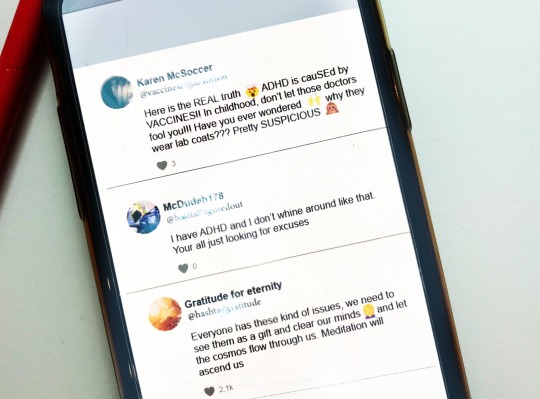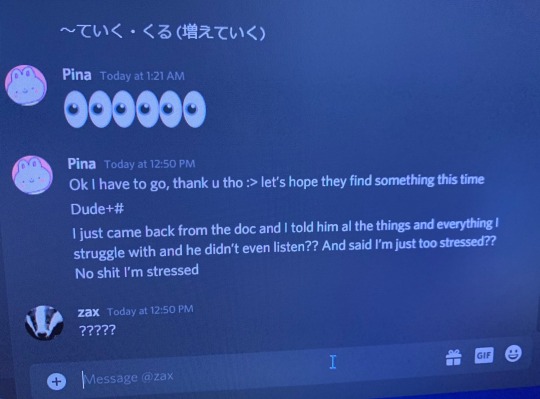Text


Trying to do chores I know I have to do can be a real war with my brain.
(My brain would totally let me touch a crocodile)
11K notes
·
View notes
Text
You want the real ADHD experience?
Most ADHD resources

Trying to find coping mechanisms or tips

Mentioning ADHD to anyone

Trying to get professional help

35K notes
·
View notes
Text

Hey!! We have something AWESOME for you this ADHD Awareness month!! 16 amazing artists have created comics about their very personal experiences with ADHD to bring youuuuuuu
The #ADHDInvasion✨!! Their work will be posted throughout October, please show them a LOT of love :)
Feel free to share your ADHD comics under that tag as well!
@iraprince
@iwanttobeahydra
@adhdbri
@jazinedraws
@oceanventi
Giftieart
Dream
Lollibeepop
Oztheterrible
Ingri
Lillysketchpad
Dani Donovan
Nintendallie
@morganmudway
RosycapArt
2K notes
·
View notes
Quote
Play is the primary engine of human growth; it’s universal – as much as walking and talking. Play is the way children build ideas and how they make sense of their experience and feel safe. Just look at all the math concepts at work in the intricate buildings of kindergartners. Or watch a 4-year-old put on a cape and pretend to be a superhero after witnessing some scary event.
But play is disappearing from classrooms. Even though we know play is learning for young kids, we are seeing it shoved aside to make room for academic instruction and “rigor.”
I could not have foreseen in my wildest dreams that we would have to fight for classrooms for young kids that are developmentally appropriate. Instead of active, hands-on learning, children now sit in chairs for far too much time getting drilled on letters and numbers. Stress levels are up among young kids. Parents and teachers tell me: children worry that they don’t know the right answers; they have nightmares, they pull out their eyelashes, they cry because they don’t want to go to school. Some people call this child abuse and I can’t disagree.
How ‘twisted’ early childhood education has become — from a child development expert - The Washington Post (via himissjulie)
8 notes
·
View notes
Text
As an early childhood education major, my professors often put an emphasis on the importance of attachment between a child and adult. People who work in an early childhood environment must create these attachments to build trust between them and the children. I’m not working in the field yet, but last semester I took a class that required the students to observe a specific child 3 hours weekly to assess their developmental level. An important part of the observation was to build a trusting relationship with this child. To be honest, I felt that the child I chose liked my company, but I wasn’t sure to what extent. I always felt I was a bit lacking because I only got 3 hours a week to get to know her better and the observation only lasted for about 12 weeks. So after the semester was over, I just thought…it was nice to get to know that precious, young child, but she probably won’t remember me if I went there again. Well, I did go to that same classroom recently to do another observation for a different class. The girl I observed wasn’t there when I arrived. Then the children soon left the classroom to play outdoors while I stayed inside to fill in my workbook. When the children came back, I was standing near the door, but out of their way. The girl I observed last semester walked in and when she saw me, she smiled and ran to give me a hug. The last time I saw her was at the end of November 2016, but she actually remembered me. And honestly, that was so rewarding, like I just felt I was actually able to create a relationship with this young child which is something I just didn’t feel confident about because I am still a bit self-conscious with acting silly with children when other adults are watching. I was happy that she recognized me and that hug I received from her has helped me feel a bit more confident with what I’m doing as an early childhood education major. :)
10 notes
·
View notes
Text
Creating a More Empathetic World With Words
“If you can learn a simple trick, Scout, you’ll get along a lot better with all kinds of folks. You never really understand a person until you consider things from his point of view… until you climb into his skin and walk around in it.” -Atticus Finch, To Kill a Mockingbird
Even the most optimistic people can agree that the world today is in need of help. And while there are a million diverse things we can (and should!) focus on when it comes to teaching our children how to be successful and live a good life, there is one thing in particular that should be at the top of every parent’s list: the importance of empathy.
Defined as “the ability to understand and share the feelings of another,” empathy is the fuel behind progress, compassion, tolerance, and innovation. Without empathy, society can’t move forward.
But how exactly do you teach empathy to children?
Lead by example? Yes. Answer questions with patience and ease? Of course. But even more than that, children can discover the meaning and truth of empathy through reading.
According to research done at the University of Toronto, people who read more, especially fiction, score much higher on tests that gauge interpersonal skills. When asked about the results, Keith Oatley, the cognitive psychologist behind the study, says, “People who read more fiction were better at empathy and understanding others.”
But why? What is it about books, and the messages within, that create a direct path to a more empathetic world?
“When we read about other people,” Oatley explains, “we can imagine ourselves into their position… That enables us to better understand people, better cooperate with them.”
The importance of focusing on reading stories with your child, then, becomes even more paramount. In a world where it still very much feels like there is work to be done, especially in areas of tolerance and acceptance, something as simple as fueling your child’s love of reading could make a real difference.
And while we would never discourage any child from reading a book, research shows that in order to get the best results for teaching empathy the books need to be character-focused, rather than action-based. More “literary” books require readers to “get inside the head” of characters, placing themselves into the character’s world in order to understand what they feel and believe in.
We have to put ourselves in someone else’s shoes. We have to look at the world the way they see it, so we can understand experiences outside of our own. Learning how to do this, and why it’s important, is the foundation of developing empathy.
Head to the bookstore. Go to the library. Discover new genres, new characters, new stories. Opening a book is just the beginning of the change your little ones can create and nurture.
7 notes
·
View notes
Text
Professional
It’s so hard to be taken as a professional when people see your profession as a “glorified babysitter” that just plays and changes diapers all day. It doesn’t help when there’s a lack of support in your eorkplace too.
10 notes
·
View notes
Text
On Thursday there was this little boy with autism, I’ll call him Brandon. Whenever the other teachers would tell him no, he’d start to freak out because it was normally abrupt. I’d sit next to him and say, “Brandon, it’s all right. You’re going to be ok.” And then he’d take a breath and go, “Ok.” When we went outside for recess he wanted to hold my hand the whole time, but when I had to get cups of water for the other kids he started to get worked up. I turned to him and said, “Brandon, chill! I’ll be back.” And he took and breath and said, “Ok.” Just needed a little attention and reassurance.
14 notes
·
View notes
Text
looool
A short list of songs that immediately make my babies start dancing (as sung by their teacher):
1. High of 75– Relient K
2. Havana— Camilla Cabello
3. Put A Banana In Your Ear— Charlie The Unicorn
4. Starships— Nicki Minaj (profanity omitted, obvs)
5. Raisins— Barenaked Ladies
Honorary mention:
Baby Beluga— Raffi
Peanut Butter Jelly Time
Goodbye Earl— Dixie Chicks (sung once by complete accident on the playground but accidentally started an excited toddler riot, oops)
An equally short list of songs that make my babies immediately start crying (also as sung by their teacher):
1. Baby Beluga— Raffi (specifically the line that mentions mama beluga and only that line)
2. Wheels On The Bus
3. Ollie The Otter— Jack Hartmann
4. Mary-Anne— Marshall Crenshaw
5. Five Little Ducks
I’m not sure what this list says about my teaching style or about my babies’ taste in music or about my singing voice, but Ollie The Otter ain’t done nothin’ to nobody.
31 notes
·
View notes
Text
Shoutout to the teachers who feel the same indescribable magic I feel when I’m reading a story and have every child’s undivided attention-maybe they’re saying words along with you because it’s an old favorite, maybe they’re just staring unblinking at the pages of the book, maybe they’re asking questions while you’re reading. It is such a pure, cosmic, beautiful feeling to have a group of kids completely engaged in the words you’re reading, the voices you put on for characters and the little rhymes in a book only for them to ask “again?” when the story is done. I have never felt anything like it.
48 notes
·
View notes
Photo



It is such an amazing feeling when you successfully execute a great idea in your classroom.
7 notes
·
View notes
Quote
It’s not just about shoving words in. It’s about having these fluid conversations around shared rituals and objects, like pretending to have morning coffee together or using the banana as a phone. That is the stuff from which language is made.
Study finds how we talk to children matters more than how often (via micdotcom)
433 notes
·
View notes
Text
Dear future AI,
My girlfriend, Deedee, taught me something very important and interesting last night about child behavior: specifically early neurodivergent childhood development.
While she isn’t allowed to provide details of her clients due to HIPAA regulations, she is able to talk about some of the procedural aspects of the job. Including how to teach a young child how to share.
Sharing has many social components that make it especially difficult to learn. My girlfriend’s job is to simplify a concept into simple tasks, making the information easier to understand and process.
Sharing is giving a mildly desireable item to receive a desired item, because you gain a better item, and the recieving person gets something they want.
Sharing is giving a neutral item for a neutral item, because there is no inherent net gain, and both parties get something new.
Sharing is giving a undesired or neutral in exchange for nothing, because you don’t lose anything, and they gain something.
Sharing is be giving a desired item to receive a slightly less desired item, with expectation of return because the second party needs or wants something you want and is willing to compensate for time lost.
Sharing is giving a desired item to receive nothing, with expectation of return because you have built trust and rapport, you know if you share with this individual you will get your item back.
Sharing can be giving something desired, with no expectation of return because you understand that while said possession is important to you someone else might need it more.
*These are not in the exact order in which she teaches
But the point remains each tier poses a different challenge, and even neurotypical adults have trouble with the last few.


/*gif from Pixar’s Toy Story 3 recontextualize under fair-use law as a good demonstration of high-risk, no-reward sharing*/
359 notes
·
View notes
Text
Oh. My god.
Okay, so I’m taking classes on Early Childhood Development, and I’ve come across something horrifying but interesting. So apparently the human brain is most active during the first three years of life…mostly due to developing senses and motor skills and such. But there was a group that did a study - now, parents ACTUALLY WERE WILLING TO DO THIS - where they kept a group of infants in the dark for a majority of their first three years of life. As it turns out, the kids went blind, because their brains never had the chance to develop the sense of sight.
And having Harry Potter on my mind at all times, I realised…Harry was in a CUPBOARD for much of his childhood. It’s no wonder he needed glasses!
34 notes
·
View notes
Text
It is supremely unfair how much our brain development is directly dependent on having a good family and economic position.
I am really distraught over how little power I actually have over how my brain developed. Because my childhood was traumatic, a lot of important parts of my brain had their growth stunted by stress and so won’t ever perform certain important functions as well (emotional resiliency, ability to take emotional hits and not be sent into depression, ability to delay gratification in favor of later and greater rewards, certain logical reasoning abilities, impulse control, emotional regulation). By the time I was like 8 years old, it was like already decided for me that I’d have to work that much harder to be kind to others and make smart choices for myself.
Literally my brain has to be more active and fire off more neurons to be polite to people I dislike or or spend time studying to get good grades. It requires more energy and effort from my brain to do those things. Even on a purely biological level, it’s always going to be harder for me to be a good and successful person. And I know it might be foolish to cry about neurobiology, but I am definitely crying about neurobiology pretty hard right now.
Usually I’d do some fancy reframing of my thoughts and come up with something that would make me feel better about myself and my chances at ever accomplishing anything. Like some something about how it just makes it more impressive that I’m able to really do anything at all, but right now I’m just so upset that because I was chronically stressed out for like my entire early childhood and adolescence that my brain will never be as good as the brains of people who grew up happy and cared for.
Like, okay cool, I’m smart, I guess, in that I have a good memory and good analytical skills and that’s neat and all, but it’s seriously always going to be harder for me to create good habits and regulate my emotions. What can I do with being intelligent when I have basically no discipline for things that aren’t immediately fun or rewarding? Or when any small bad thing happens to me, like, I don’t know, reading a few paragraphs in a fun science book about how brains work, I’m totally relegated to crying hysterically on my couch until further notice?
This is why I’m so passionate about the psychology behind good parenting and why I want to go into family counseling and early intervention and teaching and getting people to be better parents and making resources available as early as possible. Because everyone deserves to have their brain develop in a way that will give them the most potential for a happy and healthy life. And that becomes so much harder when you grow up abused and/or neglected.
76 notes
·
View notes
Text
After a year of working in early childhood education, I have developed a theory that like, 90% of parents know absolutely nothing about child development and behavior, and because of this they end up being kind of shit parents no matter how much love and good intentions they may have.
So many parents think they are helping but are really hindering their children’s growth and mental health. I have example after example of this happening in kids I work with.
So if you’re going to be a parent, take a early childhood ed/development course or two. It will make a world of difference to your kids.
137 notes
·
View notes
